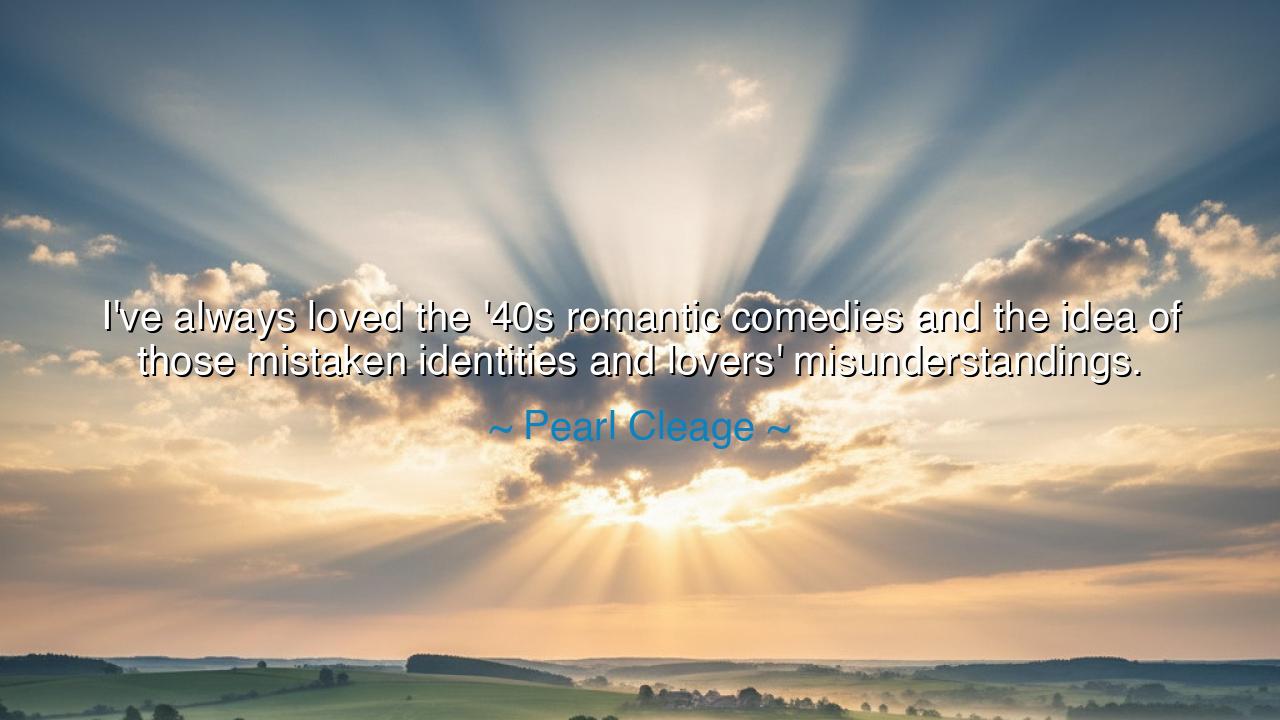
I've always loved the '40s romantic comedies and the idea of
I've always loved the '40s romantic comedies and the idea of those mistaken identities and lovers' misunderstandings.






“I’ve always loved the ’40s romantic comedies and the idea of those mistaken identities and lovers’ misunderstandings.” Thus speaks Pearl Cleage, drawing our attention not merely to the films of a golden age, but to the ancient drama of human love itself. For though her words seem light, they touch upon truths as old as the heart: that romance is rarely a straight road, that joy is often mingled with confusion, and that the sweetest stories arise when what is hidden is at last revealed.
In the romantic comedies of the 1940s, we see men and women entangled in webs of confusion, dressing as another, speaking in riddles, concealing their true hearts until the very end. And yet, from these storms of misunderstanding, laughter and delight emerge. These tales echo the traditions of the ancients, for even in the days of Euripides and Plautus, mistaken identities filled the stage. The masks worn by actors in the amphitheater remind us that love itself often hides behind disguises until courage unmasks it.
Consider the tale of Shakespeare’s “Twelfth Night,” though born long before Cleage’s era of film. Viola, cast ashore by fate, dons the attire of a man and serves Duke Orsino, who himself pines for another. Confusion reigns: the Duke loves a lady, the lady falls for Viola in disguise, and Viola secretly loves the Duke. It is a dance of misunderstanding, where comedy and sorrow intertwine until the truth bursts forth, and harmony is restored. The stage, like life, shows us that mistakes in love are not merely obstacles—they are the fire that tempers devotion.
Pearl Cleage’s affection for these comedies points us to a deeper wisdom: misunderstanding in love is not a curse, but a test. To endure the storms of confusion, to laugh in the midst of error, to seek truth even when veiled—this is the journey of every heart. The ancients would say that Eros delights in tricks, binding hearts together not through ease, but through trial. It is the very difficulty of love that makes its triumph radiant.
Yet we must not mistake this for frivolity. To watch a lover falter, to wait for truth through disguises and errors, is to be reminded that patience, faith, and forgiveness are the true foundations of love. Without these, the comedy would dissolve into tragedy. With them, the misunderstandings become stepping stones, leading the lovers not away from truth, but closer to it. This is why even the lightest films of the ’40s bear within them a wisdom that endures: laughter and patience walk hand in hand toward love.
So let us take the lesson: when confusion arises in our own lives, let us not despair. Instead, let us see in our misunderstandings the seeds of growth, in our mistaken identities the masks we must shed to show our truest selves. Like the characters of old, we may stumble through disguises and tangled speech, but if we endure with grace, the final act will reveal harmony.
Therefore, beloved listener, live not in fear of confusion, nor in bitterness when your heart is misread. Instead, embrace the comedy of life, with its twists and its veils. Speak truth when the time is right, forgive when the heart falters, and laugh when the path turns unexpectedly. For as Pearl Cleage teaches through her love of romantic comedies, it is not the absence of error that makes love great, but the way lovers find each other again, even after wandering through the shadows of disguise.
And so, pass this teaching on: life is a stage where laughter and sorrow entwine, and love, though often misunderstood, is always worth the patient unveiling.






AAdministratorAdministrator
Welcome, honored guests. Please leave a comment, we will respond soon